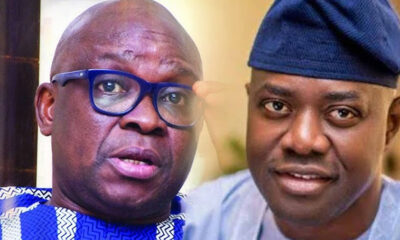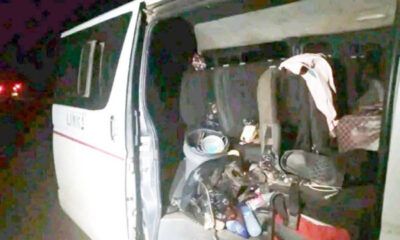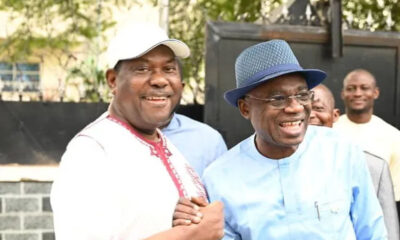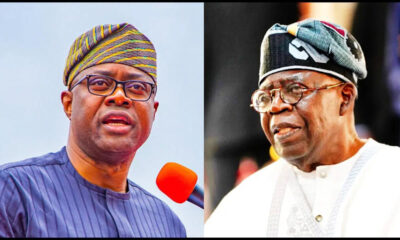Opinion
Farooq Kperogi: Tinubu’s accurate 12-year-old prediction on subsidy removal effects

Farooq Kperogi: Tinubu’s accurate 12-year-old prediction on subsidy removal effects
On January 11, 2012, Bola Ahmed Tinubu published a sober, thoughtful, deeply insightful, and penetratingly foresightful article titled “Removal of Oil Subsidy: President Jonathan Breaks Social Contract With the People” that uncannily prefigured the untoward consequences of petrol subsidy removal that Nigerians are currently grappling with.
The article has trended on social media in the last couple of weeks, but I had never taken the trouble to read it until multiple people who I regard highly sent it to me in what seemed like a coordinated torrent of forwards.
But after reading the 4,000-plus-word article and finding out that it predicted the current petrol-subsidy-removal mass excruciation Nigeria is suffering with almost mathematical exactitude, I became suspicious of its authenticity. It was too good to be true.
My incredulity compelled me to make inquiries, which led me to realize that the Nigerian Tribune had actually fact-checked the genuineness of the article on May 31, 2023. It not only found that it wasn’t fake but also scanned and uploaded a printed copy of the article published in The Nation, Tinubu’s paper.
I encourage everyone to read it. In the article, Tinubu derided the 2012 removal of petrol subsidies as the “Jonathan tax,” and the following paragraphs are particularly noteworthy for the mysterious precision of their prescience:
“Government claims the subsidy removal will create jobs…. The stronger truth is that it will destroy more jobs than it creates. For every job it creates in the capital intensive petroleum sector, it will terminate several jobs in the rest of the labor intensive economy.
“Subsidy removal will increase costs across the board. However, salaries will not increase. This means demand for goods will lessen as will sales volumes and overall economic activity. The removal will have a recessionary impact on the economy as a whole. While some will benefit from the removal, most will experience setback.
“What is doubtless is that the Jonathan tax will increase the price of petrol, transportation and most consumer items. With fuel prices increasing twofold or more, transportation costs will roughly double. Prices of food staples will increase between 25-50 percent….
READ ALSO:
- Canada grants international Masters students 3-year post graduate work permit
- Naira continues to struggle, closes week at N1,537 at official market
- Supreme Court voids AMCON takeover of Lagos Hotel
“Most people’s incomes are low and stagnant. They have no way to augment revenue and little room to lower expenses for they know no luxuries; they are already tapped out. The only alternative they have is to fend as best they can, knowing they must somehow again subtract something from their already bare existence.
“There will be less food, less medicine, and less school across the land. More children will cry in hunger and more parents will cry at their children’s despair…. Poor and middle class consumers will spend the same amount to buy much less. The volume of economic activity will drop like a stone tossed from a high building. This means real levels of demand will sink.
“The middle class to which our small businessmen belong will find their profit margins squeezed because they will face higher costs and reduced sales volumes. These small firms employ vast numbers of Nigerians. They will be hard pressed to maintain current employment levels given the higher costs and lower revenues they will face.
“Because the middle class businessman will be pinched, those who depend on the businessmen for employment will be heavily pressed. States that earn significant revenue from internally generated funds will find their positions damaged. Internally generated revenue will decline because of the pressure on general economic activity. The Jonathan tax will push Nigeria toward an inflation-recession combination punch worse than the one that has Europe reeling.
“This tax has doomed Nigeria to extra hardship for years to come while the promised benefits of deregulation will never be substantially realized. People will starve and families crumble while federal officials praise themselves for ‘saving money.’ The purported savings amount to nothing more than an accounting entry on the government ledger board. They bear no indication of the real state of the economy or of the great harm done the people by this miserly step.”
Like I have done for years, Tinubu also fulminated against “European conservatives” whose economic prescriptions are at variance “with the needs of the Nigerian populace.” He even said something that is eerily close to what I wrote in a previous column. “There has been no nation on the face of the planet that has developed or achieved long-term prosperity by devotion to conservative, ultra-free market economic ideas that dominate this government,” he wrote.
“If no nation has grown using these conservative ideas,” he asked, why are we stuck with them? I have an answer, and it’s three-fold: sadly familiar Nigerian elite self-love, xenophilic obeisance to meanspirited racist wretches at the IMF/World Bank, and a visceral disdain and blithe unconcern for ordinary Nigerians.
Like Tinubu pointed out in 2012, the removal of petrol subsidies in 2023 merely took money from the so-called oil subsidy cabal and put it directly into the pockets of politicians without hurting the bottom line of the subsidy cabal. The cabal simply pushed the extra cost of importing petrol to consumers.
In the aftermath of the removal of subsidies, allocations to the three tiers of government rose by 29.05% in just six months. By the end of 2023, governments shared N15.1 trillion, which represented an increase of N3.4 trillion from 2022.
READ ALSO:
- Nigeria troops kill 254 suspected terrorists in one week – Defence Hqrs
- Seven killed, 20 abducted in fresh terrorists’ attack on Zamfara village
- Court orders Nigerian govt to restart probe into Dele Giwa’s murder
Note that, according to the Punch of September 22, 2023, N3 trillion was budgeted for petrol subsidies from June 2022 to June 2023 (although it was N1.57 trillion in 2021 and N1.27 trillion from January to May 2022, indicating obvious fraud). In other words, the money that would have been used to keep the pump price of petrol at less than N200 per liter was simply shared between the presidency, governors, ministers, and the rest.
State governors now receive several folds more money than their normal monthly allocations without a corresponding increase in their expenditures. Because they have way more naira than they have use for (of course, they don’t care about the masses), they convert the extra naira into dollars, which contributes to the relentless depreciation of the naira, according to the BusinessDay of February 13.
In other words, to put it even more crudely, the masses and the economy benefited more from the corruption of the subsidy cabal than from what has replaced it since May 2023. But, as I pointed out earlier, the subsidy cabal isn’t hurt in the least by this change. Apart from pushing the cost of importation to consumers, they are now receiving subsidies through the backdoor to keep the price of petrol from climbing to over N1,000 a liter, which the IMF is now instructing Tinubu to stop.
The only losers are ordinary Nigerians, small businesses, the informal economy, and the manufacturing sector. After Tinubu said subsidies were gone in May 2023, the GDP of the transportation sector contracted by 50.64% in the second quarter of 2023 and by 35% in the third quarter, according to the National Bureau of Statistics (NBS).
The road transport sector is the most reliable barometer to measure the health of commerce and of the informal economy in Nigeria. Petrol subsidy removal is killing it. A November 28, 2023, BusinessDay headline succinctly captures this: “Subsidy removal pushes transport industry into recession.”
My job as an inveterate opponent of subsidy withdrawal is made easier by the knowledge that Tinubu knows the truth. He knows for a fact that petrol subsidies are not a waste, especially if the corruption in the administration of subsidies is addressed. He knows that it’s an investment in the people and in the economy.
Petrol doesn’t just power the transportation sector, it’s also the main source of electricity generation for industries, small businesses, and the vast majority of our people. Given that Nigeria has the worst electricity generation record in West Africa (and possibly in Africa), it’s easy to see why a drastic rise in the cost of petrol activates an across-the-board cost-push inflation and deepens the misery index in the country.
Tinubu knows this but has chosen to care more for the validation of the sadistic bastards at the IMF and the World Bank than the comfort and wellbeing of his people.
There’s no doubt that it’s the IMF and its evil twin, the World Bank, that are ruling Nigeria. Tinubu’s government is just a proxy. For example, just two days after the IMF told Tinubu he must remove electricity subsidies (I had no clue such a thing existed given the unreliable electricity in Nigeria) Minister of Power Adebayo Adelabu announced that the government would withdraw electricity subsidies.
The same IMF has also instructed that the surreptitious subsidies the Tinubu administration is paying to stop petrol prices from getting to—or even rising above— N1,000 a liter must be stopped. Get ready for another bumpy ride, Nigerians. Until half the country drops dead from starvation, the IMF, which is the real government in Nigeria, won’t rest. I can guarantee you that.
Farooq Kperogi: Tinubu’s accurate 12-year-old prediction on subsidy removal effects
Opinion
How a Misleading Channels TV Headline Reignited Nigeria’s Religious Tensions

How a Misleading Channels TV Headline Reignited Nigeria’s Religious Tensions
In Southwestern Nigeria, the historic heartland of the Yoruba ethnic group, religious coexistence was once deeply ingrained in everyday life. Families were often religiously heterogeneous yet harmonious: a Muslim husband with a Christian wife, parents of different faiths raising children who chose Islam, Christianity or indigenous beliefs. Religious festivals were commonly celebrated together, reinforcing social cohesion.
This tradition of harmony began to erode significantly after the introduction of the Structural Adjustment Programme (SAP) in 1986 by the military government of General Ibrahim Badamasi Babangida, under the influence of the World Bank and the International Monetary Fund (IMF). SAP policies—such as reduced government spending on education and social services, trade liberalisation and currency devaluation—triggered soaring inflation, weakened purchasing power and widespread economic hardship.
As livelihoods collapsed, some Nigerians turned to corrupt practices, while others found opportunity in the rise of commercialised religious enterprises, complete with aggressive business models and intense competition for followers. This shift contributed to rising intra- and inter-religious tensions, particularly in a region once celebrated for tolerance.
The erosion of harmony in the Southwest mirrored growing religious conflicts across Nigeria, especially between Christians and Muslims. Scholars and analysts have long warned that the media plays a decisive role in either escalating or de-escalating such conflicts. In his 2006 pamphlet Voices of War: Conflict and the Role of the Media, Andrew Puddephatt observed that media outlets can either inflame violence through partisan reporting or promote peace through independence and responsible framing.
READ ALSO:
- Carter Efe Slams Peller’s Suicide Attempt, Urges Him Back to Streaming After Jarvis Breakup
- Breaking: Popular Nigerian Actress Allwell Ademola Dies at 43
- Labour Party Urges Tinubu to Sign Executive Order on Local Government Autonomy
These concerns resurfaced sharply on 24 December 2025, when a mosque in Maiduguri, Borno State, was bombed during Maghrib prayers, killing worshippers. International and local media clearly identified the target as a mosque. Headlines from BBC, Al Jazeera, Deutsche Welle, The Cable, The Guardian (Nigeria) and Daily Trust all referenced the mosque or Muslim worshippers.
However, Channels Television published the headline: “BREAKING: Many feared dead as bomb blast rocks Maiduguri on Christmas eve.” The omission of the mosque and the emphasis on “Christmas Eve” drew widespread criticism for being misleading and inflammatory.
Reacting on X, commentator Boss Kitty Kitty (@Aashfinn) condemned the framing, warning that it fed a dangerous “Christian genocide” narrative, despite evidence that terrorism in Nigeria targets victims indiscriminately. The Muslim Public Affairs Centre (MPAC) also issued a strong statement, accusing Channels Television of editorial bias, deliberate omission of Muslim identity, and the weaponisation of language to provoke religious tension.
MPAC argued that the headline change—adding “Christmas Eve” after initial publication—suggested a calculated attempt to drive engagement at the expense of national unity. The organisation further alleged a pattern in which Muslim victims are anonymised while narratives that heighten suspicion against Islam are amplified.
Media scholars describe this practice as media bias and confirmation bias, where editorial choices reinforce preconceived narratives while excluding crucial context. Studies consistently show that headlines shape public perception, especially in an era where many readers share stories based solely on headlines without reading full reports.
The controversy came just a day after President Bola Ahmed Tinubu, in his Christmas Day 2025 broadcast, reaffirmed the government’s commitment to religious freedom, protection of all faiths, and peaceful coexistence. While the President sought to calm tensions and promote dialogue, critics argue that irresponsible media framing risks undermining these efforts.
As one commentator, @mrabdulreacts, noted on TikTok: “Narratives can be more dangerous than bullets… misleading headlines can destroy trust for generations.” The Maiduguri bombing coverage has therefore reignited urgent questions about journalistic responsibility, religious sensitivity, and whether sections of the Nigerian media are contributing to division in an already fragile society.
How a Misleading Channels TV Headline Reignited Nigeria’s Religious Tensions
Opinion
When a Tax Law is an illegality, By Farooq Kperogi

When a Tax Law is an illegality, By Farooq Kperogi
What began as a routine legislative reform of the Nigerian tax system by the Bola Tinubu administration has transmogrified and metastasized into an allegation of unexampled transmutation of a duly passed law to an illegality.
It’s by now well known that a law passed by the National Assembly and assented to by the president may have been materially altered after assent and then presented to the public as binding law. If this allegation is established beyond all shadows of doubt, Nigeria would be confronting the specter of an illegality fraudulently constituted as law.
Interestingly, the discovery wasn’t brought to public notice by secretive, conscientious whistleblowers in the bureaucracy or from eagle-eyed civil society audits. It came from within the legislature itself.
A member of the House of Representatives, Abdulsammad Dasuki, raised a point of privilege after personally comparing the harmonized bill passed by both chambers with the version of the tax laws published in the official gazette. He found that the documents did not match.
His discovery was the product of days of rigorous, studious and painstaking examination of Votes and Proceedings, committee harmonization records and the gazetted text. He realized that he voted for one thing, but the country was being governed by another.
That intervention sparked a chain reaction. Other lawmakers requested certified true copies of the assented bill to verify whether the president had signed the same text that was now in circulation. According to multiple reports, those requests were denied.
The refusal to release certified copies deepened suspicion and transformed what could have been dismissed as a clerical misunderstanding into a full-blown institutional crisis.
When legislators are blocked from seeing the law that they passed and that the president signed, the issue verges on criminal constitutional transgression that must not be swept under the carpet.
While full official disclosure is still pending, several discrepancies have been repeatedly cited by lawmakers, journalists and civil society groups. These include expansions of the discretionary powers of tax authorities beyond what the National Assembly approved, alterations to reporting and oversight obligations, changes in enforcement thresholds, and adjustments that potentially increase executive control over revenue administration.
READ ALSO:
- AFCON 2025: Mali Fight Back to Draw With Hosts Morocco in Rabat
- AFCON 2025: Salah’s Spot Kick Seals Egypt’s Knockout Spot Against South Africa
- 2026 World Cup: FIFA Throws Out Nigeria’s Appeal Against DR Congo
These are not innocent, unintentional clerical slips. They go to the meaning, scope and intent of the law. In short, they change who has power to tax Nigerians, how that power is exercised and to whom it is accountable.
The distinction matters. All legislative systems experience clerical errors. A misplaced word or a misnumbered section does not invalidate a statute. But when alterations confer new powers, remove safeguards, or shift institutional balance, they cross from error into illegality.
A gazette cannot lawfully create what the legislature did not enact or what the president did not assent to. Publication is supposed to merely provide evidence of the existence of the law. It can invent a law that hasn’t been passed.
The official responses so far have been evasive and contradictory. Government representatives initially insisted that there was only one authentic version of the law and that claims of alteration were partisan, ill-natured rumors. But that posture is difficult to reconcile with subsequent developments.
For example, a December 26, 2025, press statement signed by Akin Rotimi, House Spokesman and Chairman of the House Committee on Media and Public Affairs, said the National Assembly has now constituted an ad hoc committee to investigate the sequence of events from harmonization to assent to gazetting.
More tellingly, Rotimi said, the leadership of the legislature has directed that the tax laws be re-gazetted and that certified true copies of the versions duly passed by both chambers be issued.
Re-gazetting is not a neutral act. It is an implicit admission that the existing gazette cannot be confidently treated as an accurate record of legislative intent. If nothing were amiss, there would be nothing to authenticate. The attempt to frame this as a routine administrative clarification rings hollow. Laws are not re-gazetted in the absence of doubt about their authenticity.
Supporters of the government have urged the public to trust the president’s integrity and to avoid speculation. The issue, however, is not whether the president is personally trustworthy but whether the law now being enforced is the law he signed. No amount of rhetorical reassurance can substitute for producing the signed text and allowing a side-by-side comparison with the gazetted version.
There is no precedent in the world that I have found for this kind of illegality. In the United States, the much-cited Deficit Reduction Act controversy of 2006 involved a discrepancy between House and Senate versions due to a clerical transmission error. The president signed the enrolled bill that was presented to him.
Courts upheld it under the enrolled bill doctrine, which treats the signed text as conclusive. Crucially, there was no claim that the law was altered after presidential assent.
READ ALSO:
- Cancer Patient Appeals for Second Wife for Husband, Cites Sexual, Health Challenges
- ACF Awaits Full Details Before Commenting on US–Nigeria Airstrikes in Sokoto
- FG Confirms Debris from US–Nigeria Joint Airstrikes on ISIS in Sokoto Fell in Offa
In the Philippines, in 1964, there was a case where the wrong version of a bill was signed by the president. Legislative leaders later disowned the enrolled copy and treated the signature as invalid. Again, the error occurred before or at assent, not after. Once discovered, it was confronted as a mistake. It wasn’t normalized.
Nigeria’s case, if the allegations are borne out, is more disturbing. Here, the claim is that the president signed the correct bill but that the authoritative law published afterward materially departs from it.
Comparative constitutional practice offers no comfort here. Stable legal systems do not recognize post-assent textual mutation as valid law. Where gazetting errors occur, they are corrected. They do not become the basis for enforcement.
This raises an unavoidable question: why would anyone alter a law after it has been passed and signed? Motives can only be inferred from circumstantial evidence, but the inferences are troubling.
Expanding the powers of tax authorities in a period of fiscal stress creates incentives for bureaucratic overreach. Removing or weakening legislative-oversight provisions reduces accountability. Centralizing discretion in the executive arm simplifies revenue extraction while insulating decision makers from scrutiny. These are not abstract possibilities. They align closely with the specific alterations that have been alleged.
There is an even more unsettling implication. If a major tax reform law can be altered after assent without immediate detection, what confidence can citizens have in the integrity of other statutes? Nigeria has passed hundreds of laws over the years, many of them technical, complex and rarely scrutinized line by line after gazetting. The discovery of this discrepancy raises the chilling possibility that post-assent alterations may not be unprecedented in practice.
That possibility should alarm every Nigerian regardless of political affiliation. Law is the foundation of collective life. If the text of the law is unstable, if it can be surreptitiously modified after constitutional procedures have been completed, then legality itself becomes provisional. Governance slides from rule of law to rule by document manipulation.
The seriousness of this violation cannot be overstated. If officials altered the tax law knowingly, they did not merely breach administrative rules. They subverted the Constitution. Such conduct would amount to forgery, abuse of office and an assault on democratic sovereignty. It would mean that Nigerians are being taxed under provisions that were never lawfully enacted.
This is why a thorough, transparent investigation is not optional. It must establish a clear documentary chain: the harmonized bill passed by both chambers, the exact text transmitted for assent, the document signed by the president and the version published in the gazette. Any divergence must be accounted for, step by step, with named responsibility. Institutional reviews that end in vague recommendations will not suffice.
If culpability is established, punishment must be severe. Anything less would invite repetition. As I always say, there is no greater enabler of habitual relapses into the same crime than the absence of consequences for committing the crimes.
The alteration of law after assent is not a victimless bureaucratic shortcut. It is a constitutional crime with nationwide consequences. Deterrence requires more than quiet corrections. It requires accountability that is visible, proportionate and unmistakable.
This episode can either be buried under procedural language and political loyalty, or it can become a moment of constitutional self-correction. A tax law that is an illegality cannot be the foundation of fiscal reform. The integrity of the lawmaking process is itself a public good. Without it, no reform, however well intentioned, can claim legitimacy.
When a Tax Law is an illegality, By Farooq Kperogi
Kperogi is a renowned columnist and United States-based Professor of Journalism
Opinion
Experts Warn US Strikes in Nigeria Could Harm Civilians, Fuel Sectarian Tensions

Experts Warn US Strikes in Nigeria Could Harm Civilians, Fuel Sectarian Tensions
Security analysts and local observers have raised concerns over the recent United States military strikes in Nigeria, warning that the operations could misfire and exacerbate tensions rather than curb terrorism.
The strikes, carried out in Sokoto State on Christmas Day under the guise of counterterrorism, mark the first US military operation on Nigerian soil in modern history. The action follows repeated claims by former US President Donald Trump, who alleged a “Christian genocide” in Nigeria and threatened military intervention.
According to eyewitnesses, the areas targeted have no established history of terrorist or bandit activity, with some strikes reportedly affecting civilian-populated areas rather than forested hideouts typically associated with terrorist groups like Boko Haram and ISWAP. Analysts warn that this raises questions about intelligence accuracy and operational planning.
READ ALSO:
- Fenerbahçe Move Ahead of Galatasaray in Race to Sign Nigerian Star Ademola Lookman
- Benue Police Foil Christmas Day Kidnap, Rescue Victim Unharmed
- Alleged Alterations Threaten Nigeria’s January Tax Reforms, Lawmakers Call for Suspension
Mallam Ibrahim Agunbiade, writing on the implications of the strikes, emphasized that Nigeria’s security challenges are regionally specific. Boko Haram and ISWAP are concentrated in the North-East, while armed banditry is largely confined to forested regions in Zamfara and Niger states. “Any counterterrorism effort that ignores these realities is either grossly incompetent or deliberately misleading,” he noted.
Experts also caution against framing Nigeria’s crisis as a religious conflict, pointing out that both Muslims and Christians are affected by terrorism. Weaponizing religion to justify foreign military intervention could delegitimize Nigeria’s sovereignty and inflame sectarian tensions.
Agunbiade stressed that the country needs intelligence-driven cooperation and respect for its territorial integrity, rather than indiscriminate bombardments that may increase civilian casualties, deepen resentment, and destabilize communities.
“The goal must be accuracy, accountability, and restraint. Anything less is not counterterrorism; it is a reckless intervention with potentially devastating consequences,” he wrote.
Experts Warn US Strikes in Nigeria Could Harm Civilians, Fuel Sectarian Tensions
-

 metro2 days ago
metro2 days agoIbadan Explosion: Fayose Releases Documents, Claims Makinde Got ₦50bn from FG
-

 metro1 day ago
metro1 day agoNiger Delta Crackdown: Army Seizes ₦150m Stolen Oil, Arrests 19 Suspects
-

 metro2 days ago
metro2 days agoPlateau Kidnappers Demand ₦1.5m Each as 28 Muslim Travellers Remain in Captivity
-

 Sports2 days ago
Sports2 days agoCristiano Ronaldo Wins Best Middle East Player at 2025 Globe Soccer Awards in Dubai
-

 Opinion3 days ago
Opinion3 days agoHow a Misleading Channels TV Headline Reignited Nigeria’s Religious Tensions
-

 Sports1 day ago
Sports1 day agoAnthony Joshua injured as two die in fatal Lagos-Ibadan Expressway crash (plus photos)
-

 metro3 days ago
metro3 days agoNigerian Army Kills 438 Boko Haram, ISWAP Terrorists in Seven Months
-

 metro2 days ago
metro2 days agoBello Turji Not Killed in US Airstrikes, Security Expert Debunks Reports















